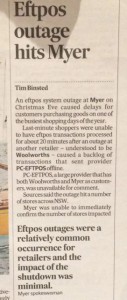Reserve Bank consultation on card fees
Following the federal government’s announcement about debit card fees, the reserve bank today announced details of its consultation on card fees. The issues paper provides good background on the move:
The Reserve Bank of Australia (RBA) is conducting a review of merchants’ card payment costs and surcharging. Australians use cards extensively to pay for goods and services and benefit from the convenience and security provided by card payments. However, in an environment of heightened concern around the cost of living and ongoing changes in payment preferences, merchants and consumers are increasingly focused on card payment costs and surcharging. These two issues are linked as merchants would be less likely to surcharge consumers if card payment costs were lower. Accordingly, it is timely to review whether the RBA could do more to put downward pressure on merchant card payment costs by promoting competition and efficiency and whether the RBA’s surcharging framework remains fit for purpose. This review also recognises that some years have now passed since the surcharging framework was introduced.
Retailers have an opportunity here to have their say in relation to payments. Take your time to read the issues paper and understand the extent of this first phase of a bigger project.
The RBA is seeking views from interested stakeholders on the issues raised in this paper. Written submissions on the issues discussed in Section 2 should be provided by 3 December 2024 to: pysubmissions@rba.gov.au
This is a hot topic for retailers and consumers. Having your say puts you into the conversation.
While associations, groups and other collectives will lodge submissions, my experience with government enquiries is that they appreciate hearing from individuals, or in this case, individual businesses.
